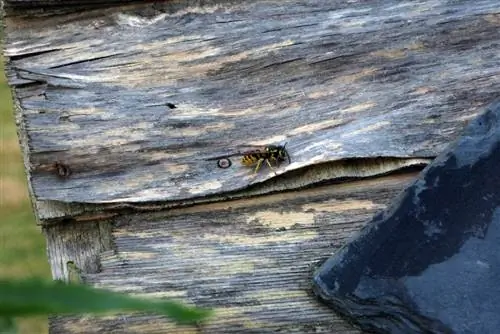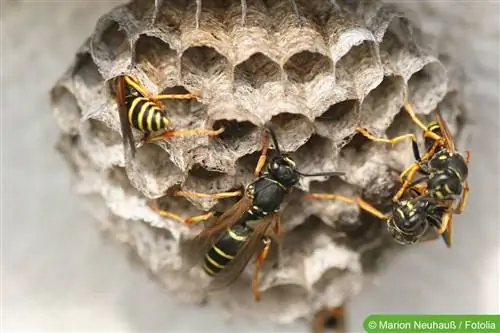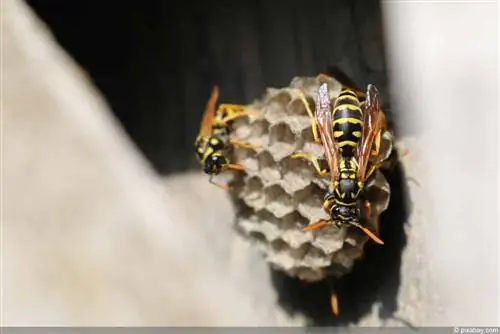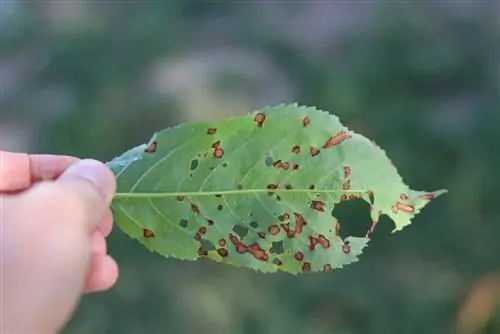- Author admin [email protected].
- Public 2023-12-17 03:39.
- Last modified 2025-06-01 06:48.
The fear of death from wasp allergy seems to be omnipresent in Germany. By far the largest number of wasp stings are harmless despite the brief, intense pain. Only when a wasp sting causes an exceptionally violent reaction is it examined on a case-by-case basis to determine whether the reaction is caused by an allergy.
Effects of wasp poison
Every person shows a local reaction to the poison cocktail with which a supposedly threatened wasp defends itself. Wasp venom initially acts directly at the puncture site, where it irritates and damages the tissue. Redness and inflammation can occur here, itchy hives and swelling can occur, and there may also be blisters and a feeling of heat at the sting site. These acute symptoms appear very quickly and are almost always at their maximum after a few hours. If you are stung at exactly one joint, the swelling can limit mobility. Rapid medical treatment is recommended if you are bitten in the throat or larynx, as the swelling can lead to acute shortness of breath. Permanent damage caused by the death of affected cells is possible, but rare; the bite has usually become infected due to other influences. It is possible for the wasp to bring bacteria with it when it visits your cake, but it is unlikely if it stings: the bacteria are usually killed by the wasp venom. These local symptoms subside after a few days at the latest. If the injection site becomes red and swollen and stays that way for a long time, this is usually a local allergic reaction (for which the German Society for Allergology and Clinical Immunology does not yet recommend specific immunotherapy).
The insect poison also contains some substances that affect the entire human system. The respiratory tract and circulatory system in particular can show reactions, and the insect venom also releases inflammatory substances from the body's mast cell stores. These substances can cause symptoms that are similar to allergic reactions (such as swelling or circulatory problems) but are caused by the poison. These symptoms rarely affect he althy, strong people. If serious reactions occurred, those affected were usually stung several times, and a particular individual willingness to react was met with a general physical weakening. Patients suffering from the rare mastocytosis are particularly at risk.
No allergy after the first bite
The allergic reaction that so many people fear is only expected in around four percent of those stung. However, not if it is your first wasp sting - this sting only triggers sensitization, which is the prerequisite for some people to develop an allergy the next time they are stung. Since only about every second German has ever been stung by a wasp in their life, this fact can perhaps put the fears into perspective.
However, if you have already been stung by a wasp, caution is advised, especially if the local reaction to the first sting was very severe. The next bite doesn't have to have any serious effects either; this is where the insect venom allergy first develops and then gets worse with repeated bites from the same type of insect.
Treatment of wasp sting
If you only react very slightly, you can simply cool the sting and wait. The treatment of the somewhat more severe wasp sting initially consists of treating the local reaction; cooling compresses are usually prescribed with the affected extremity elevated, and sometimes anti-inflammatory cream or cortisone ointment. To further treat the swelling, antihistamines, anti-inflammatory drugs or decongestant medications are prescribed. If the patient shows physical (non-allergic) reactions beyond the injection site, depending on the extent of this toxic reaction, the doctor will decide whether to administer cortisone, possibly administer antihistamine directly and prescribe antihistamine tablets and decongestant medication later. In the case of cardiovascular problems, patients can also be placed under inpatient observation.
Only if the consequences of the wasp sting are very serious, the doctor will put the patient in a shock position and establish a venous access through which he can administer medications that are necessary in the event of circulatory failure; the patient may receive oxygen. Such a severely affected patient remains under observation for at least 24 hours.

If an allergy is suspected, a detailed anamnesis is carried out that includes numerous questions. The doctor must determine which insect caused the symptoms, whether there are multiple stings and whether there is a stinger in the skin (this would be an indication of a bee sting) before thoroughly assessing the symptoms. Every detail, including the timing, is recorded; with this finding, the patient is sent to an allergist.
Wasp allergy - when can and should immunization take place?
Only when the allergist determines through tests that an allergic reaction really exists does hyposensitization occur, which can free the patient from unpleasant reactions in the future. Depending on the patient and the circumstances, several vaccination schedules are available for this desensitization. These vaccination schedules differ in duration and dose: The slow vaccination schedule works with careful increases in the dose over a longer period of time; in the shortened vaccination schedule, the dose is increased quickly at short intervals; rush hyposensitization is carried out in urgent cases during a hospital stay Maximum dose reached in a few days.
Emergency kit for wasp allergy
If a wasp allergy is diagnosed, the person affected will be given an emergency kit that they should carry with them every time they spend time outdoors from now on. It contains antihistamines (tablets or drops), cortisone tablets and an adrenaline injection, which the patient can administer themselves if there is impending circulatory failure or anaphylaxis. Even after using the emergency kit, you must see a doctor immediately; the allergy symptoms can reoccur.






